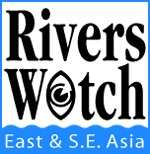
April 12, 2001. Mr.
Hiroshi Yasuda Dear Mr. Yasuda, Examining the history of industrialization, a model of development has emerged in which the needs of local communities and peoples directly affected by the impacts of development projects are often neglected. This has had tragic impacts upon millions of people. The consequences of development-induced environmental destruction are being felt with phenomena such as global warming, desertification, and loss of biodiversity. Unfortunately, it has been this model of development that has shaped much of the ODA and international economic cooperation patterns we see today, and JBIC is clearly also a product of this history. There is hope, however, as we see international financial institutions beginning to re-examine their policies and implement more stringent social and environmental practices. We write to you as members of Rivers Watch East and Southeast Asia (RWESA), a regional network of NGOs and dam-affected peoples working to stop destructive river development in the region. RWESA is aware that JBIC is currently establishing new environmental guidelines, and would like to encourage it in this process. We urge JBIC to make a clear commitment to adopt the strategic priorities and policy principles defined by the World Commission on Dams (WCD) and reflect this commitment by incorporating the policy principles into the new environmental guidelines of JBIC. Specifically, we call on JBIC to:
JBIC should refrain from funding any project that violates the WCD policy principles. To fund projects which violate the principles, thereby violating the rights of project affected communities and damaging the environment, would only indicate hypocrisy rather than sincere commitment to development which respects human rights and environmental sustainability. We would appreciate very much if JBIC would inform RWESA of its position regarding the WCD report and the current status of progress being made on the environmental guidelines. As members of international civil society, we encourage JBIC to develop a set of guidelines that are consistently implemented. We hope that these guidelines can be a model for other export credit agencies, and JBIC can act as a leader in this field. We look forward to hearing from you. Endorsed
by: cc. Study Group on Environmental Guidelines for JBIC, JBIC Hong Kong Office |